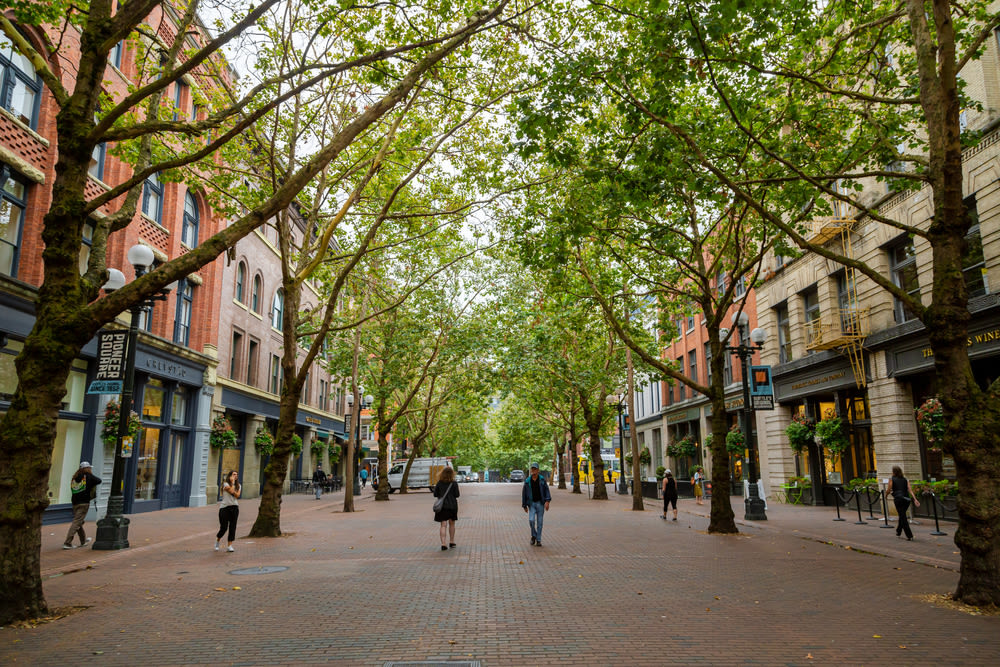How an Alliance Helps Pioneer Square Small Businesses Persevere

Occidental Park could use a comeback.
Image: CineCam / Shutterstock.com
There was a bit of a buzz yesterday afternoon in Pioneer Square. With the Mariners game wrapping up at T-Mobile Park a mere two hours before the Sounders were set to play at Lumen Field, baseball and soccer fans criss-crossed on the cobblestone walks near the stadiums. Some stopped at Taylor Shellfish Oyster Bar, slurping and sipping. Others downed beers outside the Quality Athletics Field House. Generally speaking, patios teemed with patrons.
Still, for all the sunshine on this Sunday, the foot traffic couldn't obscure the emptiness in the shadows of Occidental Park's urban canopy. Gone for good were businesses like Copal, a Latin American–inspired restaurant at the corner of Occidental Avenue and South Jackson Street that shuttered last year. Temporary closure signs loomed in other storefronts.
Nonprofit Alliance for Pioneer Square isn't sure how many of the 582 small businesses in the community pre-pandemic have survived during the crisis. But there's no doubt that Covid-19 has walloped the area. Like other parts of the city, cruise cancellations and remote office work have stymied foot traffic. Unlike other parts of the city, stadium attendance restrictions—fans couldn't attend Seahawks, Mariners, or Sounders games once stay-home orders went into effect—and a relatively low residential rate have exacerbated that slowdown. "We don't have that built-in market that a lot of other neighborhoods across Seattle do," says Lisa Howard, the Alliance's executive director.
The nonprofit has delivered injections of support t0 help compensate for the loss in visitors. Launched in 2010 to assist and advocate for the neighborhood, the Alliance has provided more than $175,000 in direct funding to small businesses; fashioned an online marketplace with products from more than 90 sellers; and helped business owners navigate byzantine paths to grants and rent relief—a vital "clearinghouse," says Intrigue Chocolate Co. co-owner Aaron Barthel. "As a business owner during Covid, you got a million emails a week, from different agencies, different levels of government, trying to connect you to things. And all of your time was spent just trying to sift through this for anything that might be critical."
The organization, however, also fostered resilience by linking small businesses to other resources: each other. When Saké Nomi's lease on South Washington was set to expire last October, it was "almost impossible" to view new spaces, recalls owner Johnnie Stroud. The search came at a tough time for the saké purveyor; he'd started the business with his wife, Taiko, more than a decade earlier, and developed a steady trickle of regulars. Yet bar and restaurant closures during the early months of the pandemic had halved its revenue.
The couple wouldn't have to struggle to find a new home, though. The Alliance connected them with Cherry Street Coffee House owner Ali Ghambari, whom the nonprofit knew was looking for someone to sublease some of his cafe space at First and Cherry. Saké Nomi eventually moved into the mezzanine level, allowing customers to browse its offerings while waiting for americanos. Loyal customers from one business now may frequent the other. "That collaboration is really working in a beautiful way," says Ghambari.
Cherry Street Coffee House has experienced its own share of hardship. Seven of Ghambari's 11 downtown locations have closed since the pandemic. His staff has dwindled from 120 to less than 20, he says. At the First and Cherry cafe, customers must buzz in to enter the store due to persistent crime in the area. But Ghambari's spirits are buoyed by collaborations in the neighborhood, including his arrangement with Saké Nomi. Without the Alliance, "it wouldn't happen this way, for sure."




